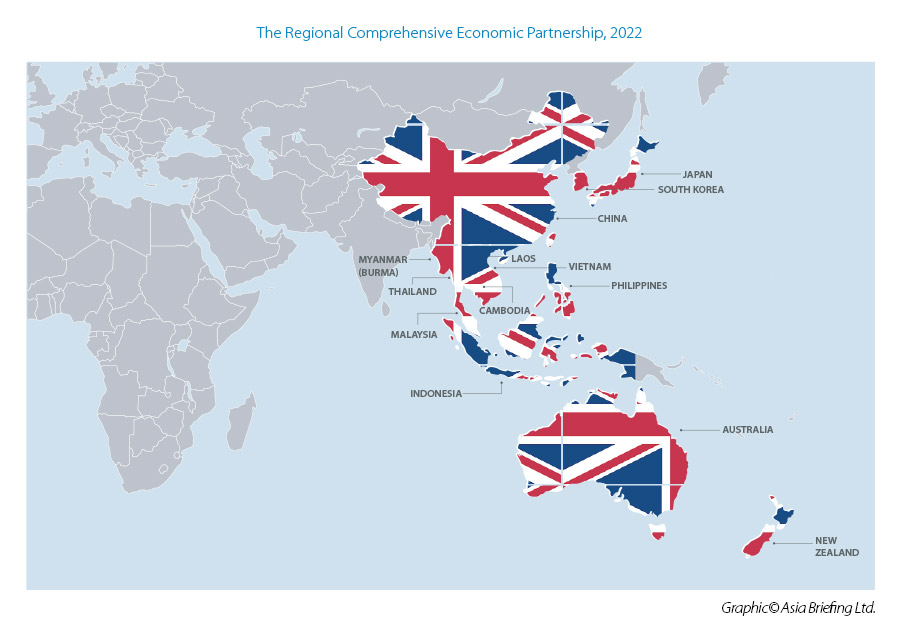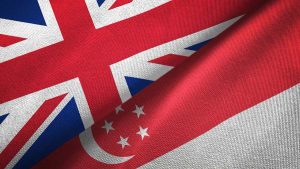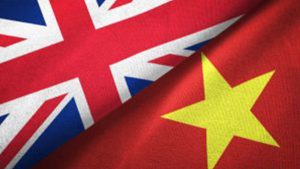How British Business Can Access China’s New £18 Trillion Asia RCEP Free Trade Agreement via the Back Door

Posted by China Briefing
By Chris Devonshire-Ellis
China has ratified the much-anticipated Regional Comprehensive Economic Partnership (RCEP) free trade agreement (FTA) and said that it hopes other members will ratify the deal for it to take effect from January 1, 2022. That is just five months from now.
The RCEP free trade agreement includes China, Japan, South Korea, the ASEAN nations of Brunei, Cambodia, Indonesia, Laos, Malaysia, Myanmar, Philippines, Singapore, Thailand, and Vietnam together with Australia and New Zealand.

The RCEP’s sheer size makes it significant. Participating economies account for roughly 30 percent of global GDP and about 30 percent of the world’s population. This equates to a market value of close to US$25 trillion (£18 trillion) and a total consumer base of about 2.2 billion, of whom an estimated 1 billion are to middle class consumer standards.
The primary aim of the RCEP is to establish a comprehensive economic partnership – building on existing bilateral ASEAN agreements within the region with its FTA partners. It will be guided by a common set of rules and standards, including lowered trade barriers, streamlined processes, and improved market access. For investors, RCEP delivers substantial new trade and investment opportunities within the participating countries and forms Asia’s largest trade bloc to date.
RCEP agreement
The RCEP agreement includes 20 chapters covering many of the articles typically found in a free trade agreement. Notably, it makes significant strides by harmonizing the rules of origin and strengthening IP measures. We examine some of the primary issues below.
Common rules of origin
One of the most significant aspects under RCEP is that the rules of origin (ROO) will be unified for the entire bloc. This will mean that investors will only require one certificate of origin for trading in the region and can bypass the tedious processes of checking and adjusting to the specific rule of origin criteria in each country. When implemented, investors can expect lower costs, added flexibility, and regional supply chains streamlined.
Trade in goods – reduced tariffs
Under RCEP, tariffs will be eliminated on around 92 percent of goods implemented progressively over the next 20 years, in accordance with each party’s Schedule of Tariff Commitments. This will allow participating countries to gain preferential market access with each other. However, some agricultural and sensitive goods will be excluded from these tariff reductions.
Trade in goods – simplified customs procedures
Simplified customs procedures and enhanced trade facilitation provisions will allow efficient administration of procedures and expeditious clearance of goods, including the release of express consignments and perishable goods within six hours of arrival.
Trade in services
Under RCEP, at least 65 percent of the services sectors will be fully open to foreign investors, with commitments to raise the ceiling for foreign shareholding limits in various industries, such as professional services, telecommunications, financial services, computer services, and distribution and logistics services.
Not unlike the negative list system in China, RCEP will also take on a ‘negative-list’ approach where the market will be fully open to foreign service suppliers, unless it appears on the list. This ensures transparency of regulations and measures which will allow greater certainty for businesses.
Investment
RCEP eases the process required of investors entering, expanding, or operating in RCEP countries. It also prevents the adoption of further restrictive measures and includes a built-in investor-state dispute settlement mechanism that can be evoked by the member states.
Intellectual protection
RCEP raises the standards of IP protection and enforcement in all participating countries. Aside from securing the protection rights for copyright, and trademark in the normal sense, it also goes further to protect non-traditional trademarks (sound marks, wider range of industrial designs) and forms of digital copyright, which goes beyond what was included in the CPTPP.
E-commerce
The agreement covers areas, such as online consumer protection, online personal information protection, transparency, paperless trading, and acceptance of electronic signatures. It also includes commitments on cross border data flows. This provides a more conducive digital trade environment for businesses and provides for greater access to RCEP markets.
Government procurement
Participating RCEP countries have committed to publish laws, regulations, and procedures regarding government procurement, as well as tender opportunities if available. This allows greater transparency for businesses to pursue government procurement market opportunities in the region. RCEP have also committed to a review aimed at improving this in future.
Market access for the UK
Although the UK is not a signatory to the RCEP agreement, there are indirect ways in which British businesses can access this market, including China, through the back door.
This is because the UK has signed free trade agreements with various member states of the RCEP. We examine British agreements with Singapore and Vietnam briefly below.
The UK-Singapore Free Trade Agreement

On December 10, 2020, the UK signed a free trade agreement with Singapore (UKSFTA). This has been in effect since February 11, 2021.
Total trade between the UK and Singapore is worth over US$22 billion; the FTA will be the first such agreement with a member of ASEAN. The UK is also Singapore’s third and second-largest trading partner for goods and services, respectively. The UKSFTA largely mirrors the FTA between Singapore and the EU (EUSFTA) and covers the trade in goods – including provisions on preferential tariffs and rules of origin – trade in services, intellectual property (IP), and the reduction of non-tariff barriers in key sectors, such as electronics and pharmaceuticals.
Through the FTA, UK businesses can better utilize Singapore’s capacity as a financial and trading hub to expand to the rest of ASEAN and the wider region including RCEP. Over 5,000 British businesses are already operating in Singapore. Furthermore, the UKSFTA serves as a steppingstone for the UK to join the Comprehensive and Progressive Agreement on Trans-Pacific Partnership (CPTPP), where Singapore is a member. The UK submitted a proposal to join the CPTPP earlier this year.
Elimination of tariffs
The UKSFTA will eliminate tariffs for 84 percent of all tariff lines for Singapore exports to the UK. By November 2024, tariffs on all the remaining products will be eliminated (for selected meat and seafood produce, textiles, fruits, and consumer goods).
The FTA will also continue to provide liberal and flexible rules of origins (ROO) for key exports from both countries. This will benefit automobiles, chemicals, textiles, machinery, pharmaceuticals, and petrochemical products.
This will allow Singapore companies to enjoy enhanced market access for Asian food products produced in the city-state under flexible ROOs, such as prawn dumplings and spicy anchovies. Up to a combined 350 tons of these products can be exported annually to the UK. These processed food products will be required to meet specific qualifying operations requirements and will still be subjected to UK sanitary and phytosanitary requirements. Singapore will also continue to provide duty-free access for all UK products.
A reduction of non-tariff barriers
There will be a reduction of non-tariff barriers for key sectors. This includes reducing duplicative testing for electronics and recognizing the international standards for motor vehicle parts. Both countries will certify systems for meat production so that the inspection of food processing plants or abattoirs for companies for exports will not be required. In addition, the UK will regard Singapore’s ‘good manufacturing practices’ in the production of active pharmaceutical ingredients equivalent to its own, making it easier for Singapore pharmaceutical companies to export its products.
Singapore’s pharmaceutical industry is fast becoming a key contributor to the development of its manufacturing sector as well as its economy.
The country’s pro-business environment and deep base of skilled talent have attracted some of the largest pharma firms in the world, and a thriving research and development landscape – eight of the world’s 10 largest pharma companies own production plants in Singapore.
There are currently more than 50 pharmaceutical manufacturing facilities in the country, enabling Singapore to become one of the few countries in the world that exports more pharmaceutical products (US$8.1 billion) than it imports (US$3.1 billion).
Sourcing from the EU and ASEAN
As with the EUSFTA, the UKSFTA enables UK and Singapore companies to continue to use EU-27 materials and parts for exports to each other’s markets. Singapore companies can also use materials sourced from ASEAN member states under the ROO for exports to the UK.
Enhanced market access for service providers
The UKSFTA will enhance market access for service providers and create a level-playing field for businesses in each other’s markets. This will impact businesses in sectors ranging from engineering to hospitality to engineering and advertisement.
The financial services sector is expected to see the most impact, given London and Singapore’s status as global financial hubs. The UKSFTA will provide opportunities for existing UK Qualifying Full Banks (QFB) in Singapore to expand, such as the addition of new customer service locations.
Government procurement opportunities
The UK will grant Singapore enhanced access to municipal-level and city-level government procurement opportunities, meaning companies can bid and invest in more government projects in Britain.
The financial services sector is set to benefit particularly in greater collaboration on cross-border know-your-customer (KYC) processes, skills development, cybersecurity, and green finance.
British companies can examine where the UKSFTA overlaps with RCEP and use Singapore as a hub to reach out to the full RCEP markets. Singapore is especially useful as a regional hub as it possesses intra-RCEP banking facilities and other financial and logistics services that are not so easily accessible from the UK. Singapore is developing as a massive global e-commerce hub for these reasons.
Singapore enjoys a corporate income tax rate of 17 percent, with no taxes due on profits realized externally from Singapore. Singapore follows a progressive resident tax rate starting at 0 percent and ending at 22 percent above US$320,000 (£170,000). There is no capital gain or inheritance tax. Income earned by individuals while working overseas is not subject to taxation barring a few exceptions.
Dezan Shira & Associates have an office in Singapore and many of the RCEP member countries and can assist with planning a market entry access strategy. Please contact us at [email protected]. Our Doing Business in Singapore guide can be downloaded for free here.
The UK-Vietnam Free Trade Agreement

Vietnam is described by the UK government as being a “significant opportunity for UK exporters” given it is progressively turning into a large market for capital goods and an expanding domestic consumer market. The UK’s Department of International Trade (DIT) has stated that the various reasons for exporting to Vietnam include:
- One of DIT’s 20 high growth markets.
- Forecast to be one of the top 10 fastest growing economies in the next decade having already surpassed Singapore to become Southeast Asia’s fourth-largest economy in 2020.
- Continuing liberalization of its economy; and
- Member of the ten-country Association for Southeast Asian Nations (ASEAN) and its free trade area which, as a regional bloc or an influential sub-grouping of countries, has been a critical driving force in concluding broader regional trade and investment agreements.
In 2020, UK goods’ exports to Vietnam amounted to US$692 million; a decline from US$839 million and US$776 million in 2018 and 2019, respectively. The largest export items were medical and pharmaceutical products worth US$131 million in 2020, followed by mechanical machinery and electrical equipment at around US$85 million each. Imports also fell, reaching $5 billion in 2020, down from US$5.9 and US$6 billion in the preceding two years.
The UKVFTA took effect from May 1, this year. Vietnam has been issuing several regulations to implement the free trade agreement. Investors should be aware of the implementing decrees to take advantage and reduce costs if trading goods between the two countries.
Rules of origin
Recently, the Vietnamese government issued Circular 02/2021/TT-BCT (Circular 2), guiding the implementation of the rules of origin under the UK/Vietnam Free Trade Agreement (UKVFTA).
As per Circular 2, the exporter is allowed to self-certify the origin of export and import shipments with a value of less than 6,000 euros (£5,100) between the UK and Vietnam. Circular 2 took effect on July 26. For an export value that is more than 6,000 euros (£5,100), exporters must have a certificate of origin (C/O) form EUR 1 authorized by Vietnam’s Ministry of Industry and Trade (MoIT). For imports worth more than 6,000 euros (£5,100) into Vietnam, exporters registered in an electronic database authorized by the UK customs authorities are allowed self-certify.
Proof of origin must be submitted to Vietnamese customs within two years of the goods being imported. Customs authorities may require a translation of the C/O if it is not in English. Certificates of origin are valid for 12 months and must be submitted to customs authorities of either country within the validity period.
Preferential tariffs
On May 21, the Vietnamese government issued Decree 53/2021/ND-CP (Decree 53) on Vietnam’s preferential export and import tariffs for the implementation of the UKFTA for the 2021-2022 period. Decree 53 was effective from May 21, 2021.
The Decree lists out two appendices that detail the products that qualify for the preferential tariffs. More specifically, goods exported from Vietnam to the UK will be eligible for preferential tariffs if they include the following:
- Commodity codes (such as HS codes)
- Commodity descriptions
- Transport documents with destination
- Preferential tariffs for each commodity
- Customs declarations declaring that the goods originate from Vietnam
Similarly, products imported into Vietnam must meet rules of origin guidelines and originate from the UK or from non-tariff zones.
The agreement will see the elimination of virtually all customs duties between the two countries when it is fully implemented. The British embassy in Vietnam has forecast that Vietnam will save US$ 151 million in tariffs from the deal while the UK stands to save around US$ 36 million.
The bilateral FTA will strengthen the Vietnam-UK relationship across trade liberalization, legal regulation, and alignment in global standards. British businesses may examine the UKVFTA and establish where mechanisms, protocols, and tariffs match the RCEP agreement. Vietnam is a suitable manufacturing and trading base from which to reach out to RCEP given its increasing productivity, worker skill set, and competitive labor market.
Vietnam enjoys a Corporate Income Tax rate of 20 percent, and taxes personal income at rates from 0 percent to 35 percent.
Dezan Shira & Associates have three offices in Vietnam and can assist with planning an entry access strategy to give access to RCEP. Please contact us at [email protected]. Our Doing Business in Vietnam guide can be downloaded for free here.
Other UK-RCEP beneficial trade and tax agreements
British businesses in other countries can access regional trade agreements by virtue of being locally domiciled. Most of the RCEP nations permit 100 percent foreign ownership, although certain industry sectors may require a local partner. General manufacturing and trading services, however, can usually be 100 percent held. Establishing a company in Asia is usually not that expensive, although some thought is required in deciding which country or region is best suited for the business to be put into place as concerns where.
Typically, different countries offer certain trade and commodity benefits that others may not have and be stronger in certain industry sectors. Operational costs and productivity rates also vary. Comparison analysis should be sought on a specific industry sector basis.
UK trade agreements with RCEP members
Apart from the Singapore and Vietnam Free Trade Agreements, the UK also has a Comprehensive Economic Partnership with Japan, and a Trade Agreement with South Korea. These may also be useful when considering a broader UK strategy to access RCEP. Our partner firms in these countries can assist. Email us at: [email protected]
UK-RCEP double tax treaties
Double Tax Treaties (DTA) do not deal directly with free trade but are useful in determining bilateral preferential tax treatments between countries. This is especially pertinent in the services industries. Professionally utilized DTA can reduce profits tax burdens on bilateral contracts by typically 10% when conducting trade overseas. The UK has DTA in place with RCEP members Australia, China, Indonesia, Japan, Malaysia, Myanmar, New Zealand, Philippines, Singapore, South Korea, Thailand, and Vietnam. Please contact us at [email protected] for advisory services related to UK tax treaties with any of these countries.
Understanding the strategic use of the UK’s existing free trade and double tax agreements with RCEP members requires professional advice. The UK FTA with Japan, Singapore, South Korea, and Vietnam should be studied, in conjunction with the applicable DTA and analyzed to note where RCEP compatibility occurs. Dezan Shira & Associates has conducted extensive research into this issue and has professionals on the ground in our offices throughout the Asian region. For assistance with developing a UK-RCEP market access strategy, please contact us at [email protected] or visit us at www.dezshira.com
About Us
China Briefing is written and produced by Dezan Shira & Associates. The practice assists foreign investors into China and has done so since 1992 through offices in Beijing, Tianjin, Dalian, Qingdao, Shanghai, Hangzhou, Ningbo, Suzhou, Guangzhou, Dongguan, Zhongshan, Shenzhen, and Hong Kong. Please contact the firm for assistance in China at [email protected].
Dezan Shira & Associates has offices in Vietnam, Indonesia, Singapore, United States, Germany, Italy, India, and Russia, in addition to our trade research facilities along the Belt & Road Initiative. We also have partner firms assisting foreign investors in The Philippines, Malaysia, Thailand, Bangladesh.
